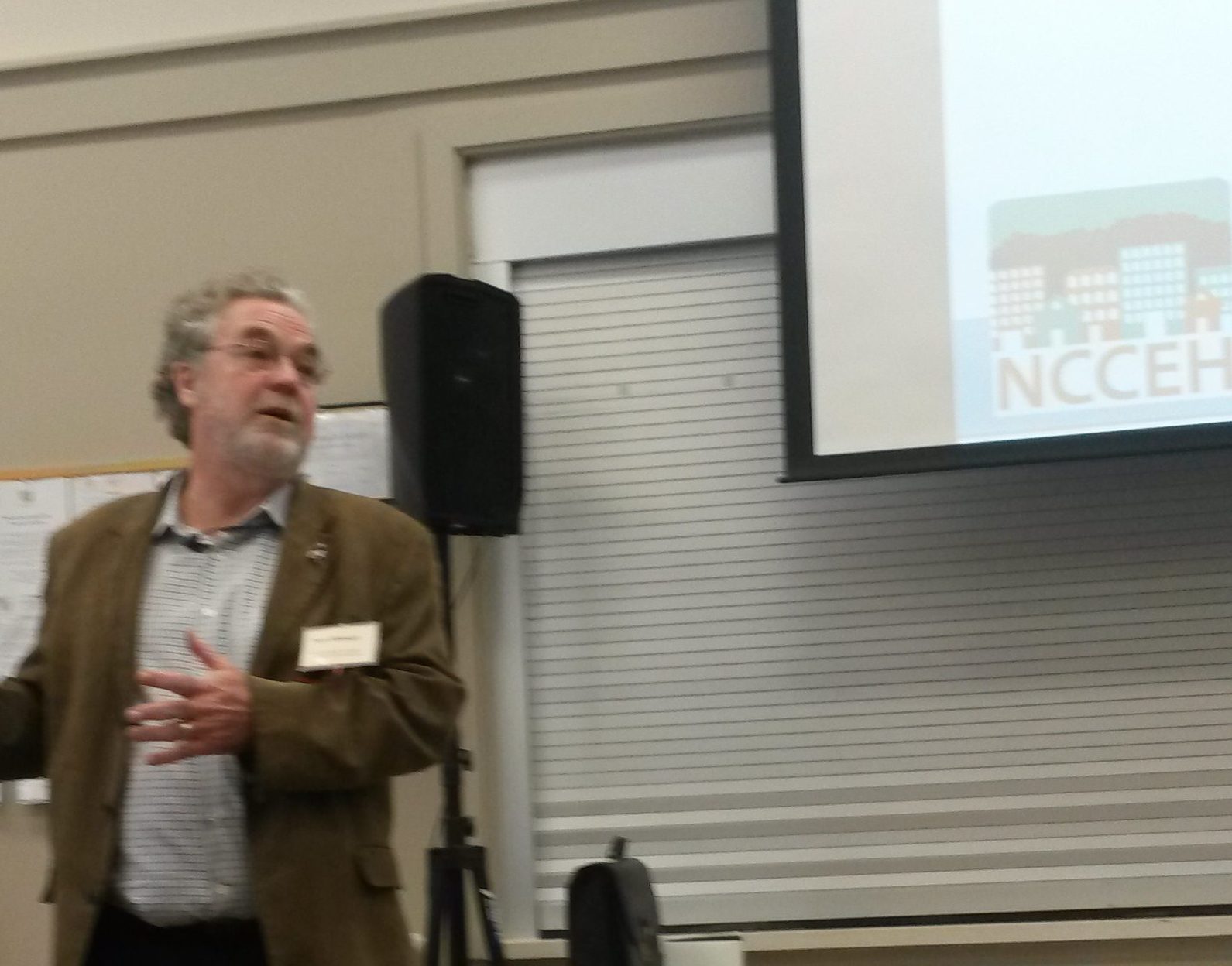Annual banquet calls attention to hunger and homelessness
By Brian Slattery
Tuesday, November 21, 2017
Copyright © 2017 The Brunswick Beacon. The Brunswick Beacon is your source for local news, sports, events and information in Brunswick County, North Carolina and surrounding areas.
LELAND — Harold Jones, a member of the Brunswick County Homeless Coalition, spoke at last year’s annual Hunger and Homeless Banquet.
At this year’s event in Leland on Saturday, he provided an update.
“Last year I talked about being homeless. Now I’m here to tell you today I am a homeowner in Southport,” he said.
Jones said he is working three jobs to reach a combined 40 hours a week.
“If you want things in life you have to work for them,” he said. “Nobody owes you anything.”
Jones said he once had a “poor, pitiful me” attitude but has learned to be positive.

The coalition brought its sixth annual Hunger and Homeless Banquet to the Brunswick senior center in Leland on Nov. 18.
Homelessness prevention organizers and volunteers met to share information on prevention and assistance efforts.
The gathering also included first-person accounts from people who have been homeless and received help from the homelessness prevention community.
Following an opening prayer from Fran Salone-Pelletier, Jones sang “Amazing Grace” as part of the invocation.
Joe Staton talked about the stigma that comes with being homeless, which makes it difficult for some people to seek or accept help.
“People can be judgmental. If they see a homeless person they think he did something wrong,” Staton said.
Staton said he had a place where he was living and was in a relationship with a woman with two children. When their relationship ended, he said, he felt he did the right thing by leaving so she had a place to live. But it left him without any housing options.
Brunswick Family Assistance helped him get into an apartment, Staton said.
“One day it was a struggle scraping by,” he said. “The next day I was able to make a plan for the future because I had a base.”

BFA executive director Stephanie Bowen said her agency helps assist people who are 130 percent below the poverty line. She gave an example of a family of four living on $25,000 a year.
In addition offering assistance with utilities, rent, medications and emergency shelter, Bowen said BFA offers a financial literacy program to teach budgeting and tracking expenses and a job skills training course to help people search for jobs and plan for applying and interviewing for them.
Bowen introduced Jaye Cuffee, who took the BFA financial literacy course when he learned his father owed $20,000 in taxes on the home Cuffee moved into with his wife and five children. He said he learned how to stay on top of bills, clip coupons and the importance of learning not to live paycheck to paycheck.
Brunswick County commissioner Pat Sykes attended the banquet to present a proclamation from the county board recognizing the week of Nov. 11-19 as National Hunger and Homeless Awareness Week.
Sykes said she grew up in a family of eight children with an alcoholic father and her family was homeless at times.
“Back then our church family provided for us. Back then I had many hand-me-downs, but I’ve come a long way because of people like you,” Sykes said, thanking the volunteers and organizers.
Cecelia Peers, administrator for the Homeless Continuum of Care, which covers Brunswick, Pender and New Hanover counties, spoke about its efforts to get an accurate picture of homelessness in the tri-county area and help the homeless find transitional and permanent housing. It tracks homelessness through the school systems, an annual nationwide point in time count, a homeless assessment report and internal database.
Peers said homelessness people are those living in a place not meant for human habitation, emergency shelters, transitional housing or exiting a temporary residence.
Peers reported 400 Brunswick County students were identified as homeless from July 1, 2016, through June 30, 2017.
The last point in time count, conducted Jan. 25, identified 27 homeless people.
New Hanover County reported 76 people came to its shelter from Brunswick County in 2016. And 133 women and children were served in the New Hanover County domestic violence shelter from July 1, 2015 through June 30, 2016.
In addition to existing shelters and resources, Peers said, specific programs like Preventative Diversion can provide funds to help people remain in housing they already have so they don’t become homeless. A Rapid Re-Housing program offers short-term financing to help put people in housing as quickly as possible and a Homeless Veteran Strategy Team can help provide veterans with affordable housing.
The keynote speaker, Terry Allebaugh of the North Carolina Coalition to End Homelessness, discussed programs like Rapid Re-Housing, his work with military and veterans’ affairs and the change in methods for providing assistance.
Where once the objective was to get homeless people housing-ready, the coalition now strives to find stable housing as soon as possible and then provide support to help them be successful, Allebaugh said. The federal objective for ending homelessness would return a homeless person to permanent housing within 30 days of beginning assistance.
While it sounds over-ambitious if the effort cuts the average amount of time a person is homeless from 67 days to 60 days, Allebaugh said, they are seeing an improvement to build on.
“We want to define homelessness as rare, brief and non-recurring,” he said.
Allebaugh also recommended groups involved in homelessness assistance get the word out by organizing a community summit and declaring their own mission to end homelessness. They could also prioritize the needs for the area, like an emergency shelter for Brunswick County.
Allebaugh encouraged the attendees to take the efforts public by making presentation to the county, city and town councils and ask former homeless people to share their stories.
“It is powerful. There is nothing like a person’s story to share this information,” he said.
Homelessness resources in Brunswick County
Hope Harbor Home is for single women and women with children who are victims of domestic violence to assists in moving on to permanent housing.
Gateway Landing, which offers a 12-month, faith-based residential program for men with life-controlling issues like substance abuse.
Brunswick County Streetreach, which coordinates interfaith sheltering during winter and access to shelter during summer.
Brunswick County Homeless Coalition assists county residents who are homeless or at risk of homelessness with resources and crisis support.
Brunswick Family Assistance helps low-income residents with food, clothing, emergency financial assistance and access to health services and other resources.
A Housing Crisis Hotline (910-444-4998) is available from 9 a.m. to 3 p.m. Mondays through Fridays to screen people for diversion or shelter
The Brunswick Homeless Task Force committee meets at 9 a.m. the third Monday of the month in the second floor training room at the Brunswick County Administration Building. Meetings are open to anyone in Brunswick County who is interested in preventing and ending homelessness.
Brian Slattery is a staff writer for the Beacon. Reach him at 754-6890 or bslattery@brunswickbeacon.com.
Copyright © 2017 The Brunswick Beacon. The Brunswick Beacon is your source for local news, sports, events and information in Brunswick County, North Carolina and surrounding areas.